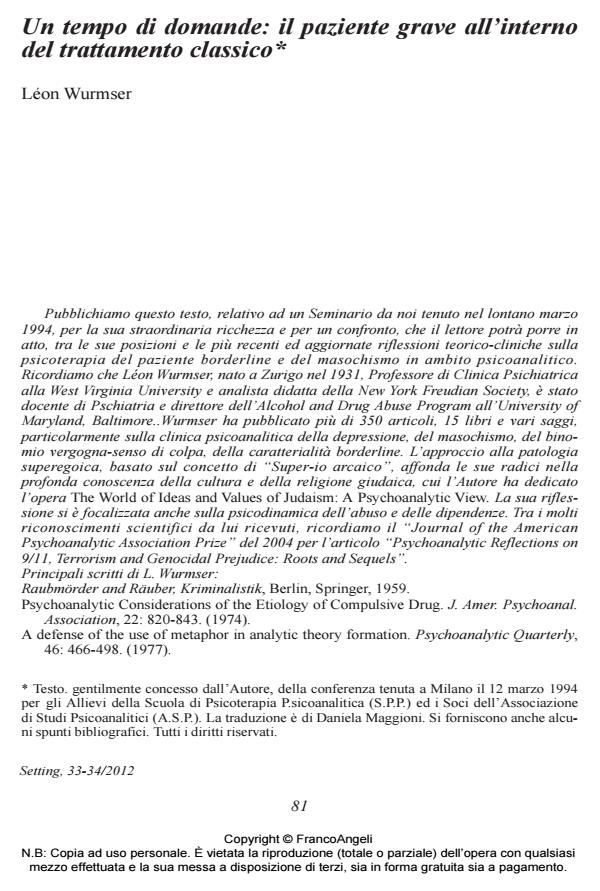Un tempo di domande: il paziente grave all’interno del trattamento classico
Journal title SETTING
Author/s Leon Wurmser
Publishing Year 2014 Issue 2012/33-34
Language Italian Pages 24 P. 81-104 File size 110 KB
DOI 10.3280/SET2012-033004
DOI is like a bar code for intellectual property: to have more infomation
click here
Below, you can see the article first page
If you want to buy this article in PDF format, you can do it, following the instructions to buy download credits

FrancoAngeli is member of Publishers International Linking Association, Inc (PILA), a not-for-profit association which run the CrossRef service enabling links to and from online scholarly content.
This Lèon Wurmser’s papers represented an important piece of our training almost twenty years ago, but some of its questions and suggestions about the "borderline" patients’ treatment seem to have a big value up to now: - the "borderline" term has no clinical mean, expressing our difficulty to recognize the non absolute discontinuity between "classical" and severe neuroses, if the so-called standard tecnique is an a-priori instrument to define the analysis criteria for patients: no pure standard tecnique has ever existed in psychoanalysis, with its prevalent or exclusive focusing on interpretations; - the conflict and the lack models are complementary and not opposite each other; - the psychoanalytic treatment of severe neuroses shows that working through the super-Ego problems need the analyst not play the role of real super-Ego and use the super-Ego transference, but analyze this as deeply as possible to achieve the patient’s intrasystemic conflicts; - we have to treat aggression not as a drive,but through the defences and Superego analysis; theories of Ego’s or Super-ego’s deficit are not useful in these cases; - complementary therapies are often requested (drugs, behavioural-cognitive interventions, couple or family therapy) to help the patient against his overwhelming affects, instead of tryng to build an impossible therapeutic alliance; - following P. Gray’s approach, the results of severe patients’psychoanalytic treatments are good, revealing the importance of super-Ego affects of shame (referred to dependence) and guilt (referred to separation). Wurmser analyzes the core phantasies about guilt and shame affects and super-Ego conflicts by rich clinical material.
Leon Wurmser, Un tempo di domande: il paziente grave all’interno del trattamento classico in "SETTING" 33-34/2012, pp 81-104, DOI: 10.3280/SET2012-033004